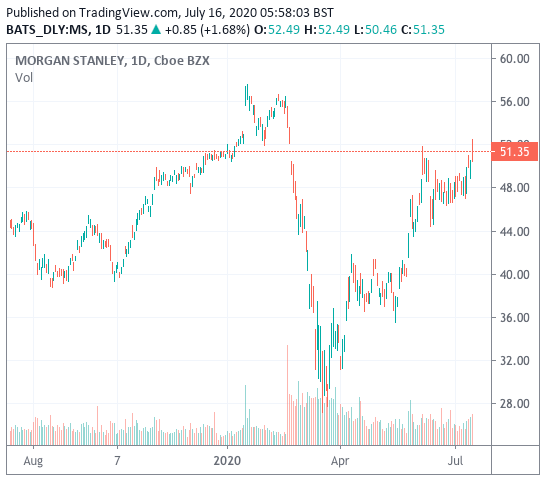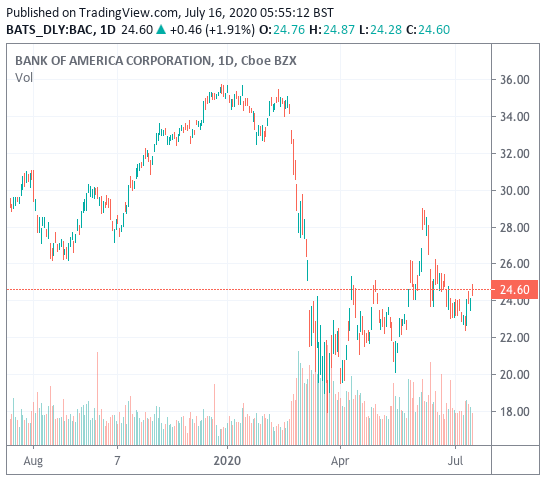
Thursday, July 16, 2020
Will robust earnings boost Bank of America and Morgan Stanley’s share prices?
By Century Financial in 'Brainy Bull'


Bank of America’s [BAC] share price has had a disappointing performance so far this year, but Morgan Stanley’s [MS] share price appears to be faring better.
As of 14 July, Bank of America’s share price was down 30.5% YTD at $24.14. This gave it a market cap of $209bn — a far cry from the $314bn valuation with which YCharts data showed it had started the year.
Meanwhile, Morgan Stanley’s share price is in the green, just. The share price climbed 0.3% since the start of the year to close at $50.50 on 14 July. This helped its market cap recover back to the $79bn mark.
Investors will be keen to see how the Bank of America and Morgan Stanley’s share prices fare when they report their Q2 earnings tomorrow (16 July).


Trading set to triumph
The reason for the divergence between the two banks has to do with their exposure to bad loans during the coronavirus pandemic. Whereas Morgan Stanley could benefit from robust trading results, Bank of America could be dragged back by loan defaults according to the Financial Times.
When Morgan Stanley and Bank of America reported first-quarter results in April, the banks had one bright spot in what were otherwise disappointing earnings releases.


Each of the firms trading divisions had managed to report good results, as frenzied trading throughout the ongoing coronavirus crisis boosted market revenues.
In its Q1 earnings, Morgan Stanley noted a 30% year-over-year jump in net revenue from institutional securities that it attributed to strong trading and sales performance. Fixed-income revenue rose by nearly $500m and equities revenue by just over $400m.
The combined net revenue increase from its trading activities helped it offset a 30% year-over-year fall in net income to $1.7bn.
The bank has the biggest stock trading business on Wall Street, according to CNBC. Despite its success in this area, James Gorman, CEO of Morgan Stanley, has previously emphasised its wealth management division as being a sturdier business.
While this section of the business posted an 8% decline in revenue in the first quarter, it could be a section to watch in the upcoming results.
Zacks Equity Research has a consensus earnings estimate of $1.17 for Morgan Stanley’s second quarter, suggesting an 18% quarter-over-quarter incline.
Meanwhile, Bank of America’s trading division gained 30% to $1.48bn in the last quarter, according to CNBC. However, this was overshadowed by a 45% year-over-year fall in profits to $4bn.
The second-largest bank in the US was hit hard by loan losses during the first quarter, prompting it to set aside $3.6bn in reserves because of the pandemic.
This will likely have a continued effect as the consumer segment constitutes 40% of the bank’s revenue, according to a report from Nasdaq. The publication suggests that analysts are expecting Bank of America to post revenue of $22bn and earnings of $0.27 per share for the second quarter.


A low-interest environment
Many analysts are reportedly bracing for what will be the worst quarter for banks since the financial crisis.
“We’ve got a full three months of the pandemic coming through the numbers now,” Kyle Sanders, an analyst at Edward Jones, told Bloomberg. “The first quarter was rough, but it really only reflected a couple of weeks in March.”


Another worrying factor is the low-interest rate environment, which is expected to weigh on the bank’s net interest margin in the upcoming quarter.
As unemployment rates continue to soar in the US, banks have had to set aside capital to cover the growing number of loans losses, resulting in slimmer net interest margins.
This will likely be reflected in Bank of America’s and Morgan Stanley’s second-quarter earnings results, but RBC expects it to be just temporary earnings pain rather than an ongoing existential capital concern.
“Our outlook is cautiously optimistic as we expect the economy to continue to gain momentum into the end of the year,” RBC said in the report seen by Bloomberg.


Both banks have a consensus buy rating among analysts.
Out of 27 analysts polled by CNN 14 rate Bank of America a buy, while 11 have a hold rating and two an outperform. The stock has a median price target of $28 among 24 analysts.
Morgan Stanley, meanwhile, has 17 out of 26 analysts that rate it a buy, with eight suggesting to hold the stock and one giving it an outperform rating. It has a median price target among 22 analysts of $55.


Source: This content has been produced by Opto trading intelligence for Century Financial and was originally published on cmcmarkets.com/en-gb/opto
Disclaimer: Past performance is not a reliable indicator of future results.
The material (whether or not it states any opinions) is for general information purposes only and does not take into account your personal circumstances or objectives. Nothing in this material is (or should be considered to be) financial, investment or other advice on which reliance should be placed. No opinion given in the material constitutes a recommendation by Century Financial or the author that any particular investment, security, transaction or investment strategy is suitable for any specific person.
Century Financial does not endorse or offer opinion on the trading strategies used by the author. Their trading strategies do not guarantee any return and Century Financial shall not be held responsible for any loss that you may incur, either directly or indirectly, arising from any investment based on any information contained herein.















